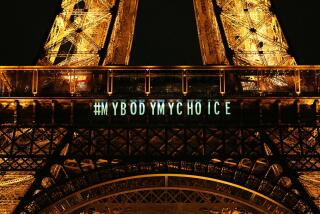French National Assembly approves ban on face veils
Reporting from Paris — The French lower house of Parliament on Tuesday overwhelmingly approved a ban on wearing face-covering veils in a public place.
The legislation, part of an ongoing national debate on French identity, is expected to have no opposition in the Senate, which is due to vote on it in September. Once signed by President Nicolas Sarkozy, who has placed it high on his agenda, the ban would take effect next spring.
Though the ban would affect only an estimated 1,900 of the millions of Muslim women in France, Sarkozy has used an accelerated legislative process to get it passed. The vote in the National Assembly on Tuesday — 335 to 1, with 241 members abstaining — came just over a year after 65 parliamentarians called for a commission to investigate whether the veil undermined French values.
Those who declined to vote were members of the opposition Socialist, Communist and Green parties, who are against women wearing the full veil, but don’t think legislation is the solution.
Green deputy Francois de Rugy accused the ruling party of “throwing oil on the fire” and “rekindling tensions strictly for electoral ends.”
Justice Minister Michele Alliot-Marie said the action was a victory for democracy and French values: “Values of freedom against all the oppressions which try to humiliate individuals; values of equality between men and women, against those who push for inequality and injustice.”
According to the legislation, covering one’s face in a public place will be subject to a fine of about $185 or community service. Far stricter penalties are aimed at those who force others to wear the veil: about $38,000 or a year in prison, terms to be doubled if the wearer is a minor. Though the wording of the law is careful not to single out Muslims, it is widely seen as a move to clamp down on Islamic extremism.
Several exceptions are noted, such as masks for health reasons, sports, carnivals and festivals.
A year ago, Sarkozy said that the burka was “not welcome” in France and that it was “not a sign of religion but a sign of subservience.” The comments provoked a public reaction that showed widespread support for a ban on both the burka, an enveloping outer garment, and the niqab, or face covering. Muslim groups, however, complained that such a ban would stigmatize all members of their religion.
Because of questions over the ban’s constitutionality, the ruling Union for a Popular Movement party has agreed to send the eventual final version of the legislation to the Constitutional Council watchdog.
A further challenge could occur from the European Court of Human Rights in Strasbourg, France. Amnesty International has said the law “violates rights to freedom of expression and religion.”
The vote Tuesday could set a precedent for other European countries. Britain, Spain and Belgium are considering similar legislation. Support for such a ban is far higher in Europe than in the U.S., where 28% of the public would approve it, according to a Pew Global Attitudes Project poll, compared with 82% in France and 62% in Britain.
Culliford is a special correspondent.
More to Read
Sign up for Essential California
The most important California stories and recommendations in your inbox every morning.
You may occasionally receive promotional content from the Los Angeles Times.










